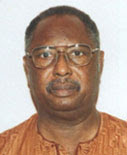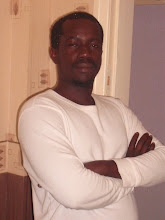

Profile of SLAIN GAMBIAN JOURNALIST
The name Deyda in Hassaniya Arabic means someone of great stature. It is not known why Deyda’s father gave him such a meaningful name, but it could be he sensed that his son had the makings of a distinguished character. If so, then his father’s intuition was spot on, because early on in life Deyda showed he was cut out for a big destiny. Unlike his other three siblings who stuck to the traditional koranic school (Dara), he had a foot in both camps - the Arabic and Western educational systems. Coming from the ultra-conservative Hydara clan that claims its ancestry from the Holy Prophet Muhammad (SAW), his hybrid education at the time must have caused quite a stir. The Hydaras are renowned in the Sahelian region for their exceptional grasp of Quranic Science, so much so that all Hydara males are schooled in the art from a very tender age and are required to uphold the clan’s heritage without adulteration and apology. But he turned out to be one of the few who dared in the thick of the Hydara conservatism to break with tradition to see how the other half lives. Though Baba Hydara had qualms about his son’s incursion into the unfamiliar terrain of western civilization, he laughed it off as a fad his son would soon outgrow, but he was mistaken – Deyda stayed the course, taking to his studies like a duck to water. But such drive is about par for the course for someone born under the zodiac sign of Gemini who are often typified by their self-will, sharp wit, astuteness, and curiosity.
Deyda Hydara was born on 9 June 1946 on Dobson Street, Banjul. His father Baba Hydara was a Mauritanian immigrant of the Moor extraction who ran a grocer’s shop at 8 Hagan Street, where Deyda grew up. On his maternal side, he descended from the Faal clan of Kaur, where Halima, Deyda’s mother, was born. When his father’s business slackened, he returned to Nouakchott, Mauritania, leaving the teenage Deyda and his younger ones - Lala, Mamana and Dawda - with their mother who later remarried one Papa Bila at Barra, where she lived until her death in 1992; two years after Deyda’s father had passed away in Nouakchott.
Like most teenage boys, Deyda took to street football with gusto. On the pitch, he would pace down the right flank, waltzing through seemingly impregnable defences to pull out passes that were usually too tricky for goalkeepers to parry, much less save; but he gave up his football mania after his secondary school teacher told him it was a dead-end career unsuitable for a hot brain like him. His quitting football is like kicking off a ladder after one has used it to climb to the top. It was through football that he forged a friendship that was to change his life forever. He hit it off with Joseph Gilikou during one of their countless football games and both of them became inseparable childhood chums, though it was Deyda who frequented more Joseph’s family home at No 10 Leman Street (now Ecowas Avenue), bantering and occasionally helping out with some domestic chores. His get-up-and-go so impressed Joseph’s aunt, Tata Aubi Caroline Keita (nee Goddard), that she enrolled him at the Alliance Francaise on Picton Street, Banjul, popularly known then as the “Foyer”.
Deyda excelled at the final examination and was sent to Lycee Gaston Berger in Kaolack, Senegal, where he lost himself in French literature. Shortly before taking his baccalaureate, he fell in love with the writings of Albert Camus, Rebalais, and Jean-Paul Satre whose existentialist philosophy originated by the Danish philosopher Soren Kierkegard caught his fascination, which in turn led him to study in-depth the works of Frank Fanon and Che Guevara. He kept up his passion for literature right up to the Cheikh Anta Diop University, Dakar, Senegal. He discontinued his university education after two years due to lack of funds.
He took this setback in his stride and pressed on with life, eager to get a job and contribute something to the family’s upkeep. At about this time he was already wide awake to his theatrical flair, as he had already strutted his stuff in a number of school dramas and musical concerts. He made up his mind then to rely on his own innate ability - his voice – and faith in God to pull him through the unknown. He got a job as disc jockey at Radio Syd, anchoring three entertainment programmes - Morning Show, Rencontre and Disque Agogo. About this time he met and married Maria Dacosta with whom he had four children – one girl and three boys.
Alongside his basic responsibilities at Radio Syd, he worked first as a translator and then as a correspondent for the Agence France Presse (AFP). He also joined The Senegambia Sun as a special correspondent and was to join Reporters Sans Frontieres (RSF) in latter years as a correspondent. He left Radio Syd to set up Excaf Printing, which metamorphosed into The Point newspaper. He took over the editorial seat of the paper when Baboucarr resigned as editor-in-chief of the paper. He was for a long time the treasurer of the West Africa Journalists Association (WAJA). The other organisations he belonged to included the Association Des Journalistes Francophones (AJF), the Faateleku Cultural Group, the Premier Lions Club and Worldview the Gambia.
Throughout his career as a journalist, he was obsessed with press freedom, good governance and economic development. In his columns - The Bite, and Good Morning, Mr President – he resisted the imposition of the media watchdog – the National Media Commission (NMA) – on Gambia journalism and campaigned without fear for the sanctity of the rule of law as well as for improvement in the lives of Gambian farmers. In his prophetic article “Acara Goes With Pepper” (The Point, Tuesday, 17 August 2004), he wrote that he was ready to pay the supreme price for the cause of a free press in the Gambia. “Government and supporters must also know that some of us have as published in 1992 and 1994 offered our lives in our social responsibility role. Maybe we are crazy but some of us would be proud to be gunned down or simply be killed for doing just that.” The NMA was eventually abolished but was soon replaced with two pieces of draconian legislation – the Criminal Code (Amendment) Bill 2004, and the Newspaper (Amendment) Bill 2004. The first bill criminalizes defamation and carries a minimum sentence of six months, while the second raises newspaper or broadcasting registration cost from one hundred thousand dalasis to five hundred thousand dalasis. The National Assembly passed both bills on 13 and 14 December 2004. In his reaction “We Shall Prevail” published in The Point’s Wednesday, 15 December 2004 issue, Deyda wrote: “The other bill that was passed last night seeks to amend the Criminal Code providing for the criminalization of speech. It does away with the options of fine and emphasizes custodial sentences of three to three years for libel, sedition, false information and the very vague derogatory language etc, etc. The above amendment is now extended to the ordinary citizen and more so politicians. With this amendment, journalists and politicians are going to be targeted even for their opinions, as per the articulation of the said amendment. We now want to inform the MPs that we have been studying the bills with our lawyer Hawa Sisay-Sabally and have verified that they have some serious flaws that must be challenged and we have decided to do just that. At a meeting held a few days ago before the passing of the bills, we had decided that we would again have to exercise our rights to seek redress, as these bills constitute an infringement on our professional pursuits and we must challenge them in court as soon as the President assents to them.”
Unrelentingly, on the night of Thursday, 16 December 2004, the 13th anniversary celebration of The Point newspaper, he reiterated his determination to fight to the death the two laws. Writing under the title “The New Laws”, he stated: “Coming back to the amendments, readers will understand that we will not divulge our line of defence as we did for the commission. Suffice it to say that we have mastered the dossier and are going to challenge these revised laws as soon as they are assented to. We have given notice for that to the hearing of the world at large.”
Shortly after writing this article, he was killed in cold blood as he drove home from work. His killers are still at large. “His death plunged the country into a mood of despondency and the media community into a profound shock from which it has yet to recover fully.”
Source: deydahydara.com


No comments:
Post a Comment